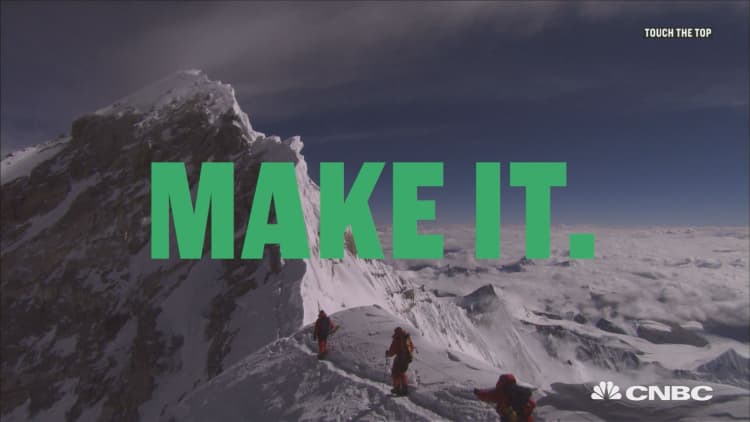Erik Weihenmayer's accomplishments seem surreal — impossible even.
Weihenmayer is the only blind person to climb the Seven Summits, which consists of scaling the tallest peaks on each continent. In 2014, he also solo kayaked the Grand Canyon, a journey of 277 miles along the Colorado River. Then there are his 50 solo sky dives.
"When I think about mountain climbing, I never think about conquering because if you go head to head with a mountain, the mountain will kick your butt. The mountain will destroy you," he said.
"You have to have a sense of humility when you go up to climb these mountains," Weihenmayer said. "I've always had humility because I was, you know, having my butt kicked by blindness."
That humility was hard earned. The blind adventurer lost his sight to a rare disease, juvenile retinoschisis, when he was 13. Weihenmayer said he had a hard time adjusting.
"When I went totally blind that freshman year, I was headstrong. I didn't want to use a cane. I didn't want to learn Braille. I didn't want to do any of the things that blind people are supposed to do because I thought that would make me blind, that would be accepting," he said.
As a result of his denial, Weihenmayer said he "fell down stairs and bashed his head open" until he realized he needed to accept his new life and use the tools available to him.
After adapting to his new reality, Weihenmayer discovered he had a natural talent for rock climbing fueling his hunger for outdoor adventure. He became the first blind person to scale the Nose of El Capitan in Yosemite in 1996.
There's certain things that you can never work out ahead of time. ... The only way to experience that is to go do it.Erik Weihenmayer
Weihenmayer is the first to credit his team with helping him achieve these milestones. For his Grand Canyon adventure, he had a friend guiding him with specific directions along the way.
"They're yelling. 'Turn a left!' 'Turn a right!' 'Hard left!' 'Charge!' ... very specific directions that get me through the rapids," Weihenmayer said.
"Teams don't just happen or maybe you get lucky every now and then, but you've got to build them carefully, very methodically," he said "You got to learn how to trust each other, how to rely on each other and how to be accountable to each other. That happens over time."
No matter how good your team is of how prepared you are, sometimes things happen outside of your realm of control.
"There's certain things that you can never work out ahead of time. When I went to Everest, going into the death zone, it's 26,000 feet above and there's no way to experience that. The only way to experience that is to go do it."





